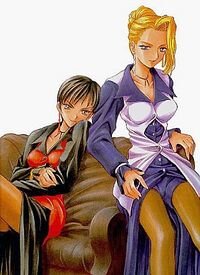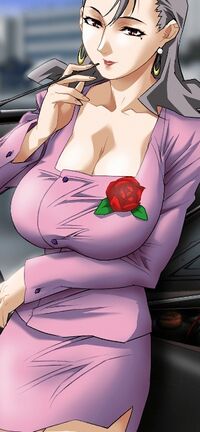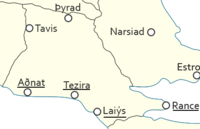Mava Organisation
 | |
| Founded | Late 1950s |
|---|---|
| Founder | Maria Vaseva and Valeria Maneva |
| Founding location | Aðnat, Aðuna, Gylias |
| Years active | 1950s–present |
| Territory | Aðnat–Tezira–Laiýs–Rance, Aðuna |
| Membership | 80.000 (estimated) |
| Criminal activities |
|
| Allies | Provenzano Syndicate |
The Mava Organisation, also known as the Mava group and Mava coterie, is a criminal organisation active in Gylias. It is mainly active in southern Aðuna, and also participates in transnational organised crime in Tyran.
Founded by Maria Vaseva and Valeria Maneva, the Mava group became notorious for its strict non-violent code of conduct, elaborate initiation ceremonies, and highly organised nature. Core criminal activities were unauthorised gambling, underground banking, racketeering, and facilitating drug trafficking through Gylias. Legitimate businesses include nightclubs, pubs, massage parlours, and various sex industry establishments.
Establishing itself as the largest organised crime group, the Mava group cultivated an image as romantic outlaws. It managed to gain a foothold in southern Aðuna and a high profile nationally. It declined in the 1980s due to economic circumstances and internal struggles.
Under new leader Myra Ďande, the group "went legitimate" in the 1990s, abandoning most of its criminal activities in favour of cooperating with law enforcement and legal businesses that capitalised on their "wicked" reputation.
The Mava group is considered the best-known and most powerful criminal organisation in Gylias. Since the 1990s, its links to the criminal world have been retained mainly to cooperate with law enforcement. Its reputation for honourable conduct and non-violence have earned it a level of public acceptance. It retains a presence in Aðunese society and the economy, and the Gylian Police consider its existence "more acceptable than the alternatives".
History
Origins
During the Liberation War, the disintegration of Xevdenite authority and the slow advance of the People's Army caused a proliferation of criminal gangs in present-day southern Gylias.
Aðnat was one of the worst-affected cities: a turf war erupted between gangs that peaked in 1951–1952, while the PA focused on liberating Nauras before a final push on the Nerveiík Peninsula.
The turf war weakened the city's gangs. Syaran migrants Maria Vaseva and Valeria Maneva seized the opportunity to establish a power base. They launched a campaign to unite the gangs under their leadership, conducted through a mixture of material enticements, intimidation, and violence.
The campaign was completed by 1956, shortly before Aðnat's liberation. The unified group chose the official name "Mava Organisation", after its founders.
Development
In order to carry out their transformation plans, Maria and Valeria initially ruled the group with an iron fist. They brought in a strict code of conduct, forbidding violence and involvement in violent crimes. Elaborate initiation ceremonies were introduced, and two years were spent disciplining the ranks and formalising organisation. The group established a solid base in the "four cities": Aðnat, Tezira, Laiýs, and Rance.
The Mava group took advantage of the National Obligation period to establish a strong black market presence. It used connections to procure and sell goods outside rationing. It set up underground gambling and banking activities, and initiated several non-monetary protection rackets. Its activities were financed with scrips and local currencies. Maria and Valeria controlled the supply of þalers, helping reinforce subordinates' loyalty.
The group also established legitimate businesses — not mere front companies, but genuine activities that would strengthen their role in the local economy. It focused on nightlife and the tourism industry, creating establishments that catered to less savoury tourists attracted to Gylias' libertine norms of sexuality and drugs. Most significantly, it established casinos, seizing a niche ignored by the government and avoiding competition with public betting pools.
Boom years

The Mava group's power hit its peak in the 1960s–1970s. Aided by the booming economy, its illegal operations were lucrative, and its legitimate businesses were profitable. It moved to honour system-based rackets, allowing it to recruit new members and avoid attention from law enforcement.
Drug smuggling became the group's primary criminal activity. Its southern Aðuna base gave it access to the Nanshe and Ruadak Oceans. The "Gylian connection" developed: the group would buy drugs from Nalaya and move them north to Knichus and Cacerta. To avoid detection, it limited its involvement to moving drugs from Gylias to elsewhere, and demanded low fees for ease of money laundering.
Maria and Valeria gambled that gaining publicity would be advantageous. Accordingly, the Mava group cultivated an image as romantic outlaws, adopting glamorous appearances and flamboyant lifestyles. Combined with their rigid code of conduct, the Gylian public came to accept the group's existence to a degree, and it gained a base of supporters impressed by their romanticised image. Maria and Valeria gained a degree of celebrity and connections to the Groovy Gylias scene.
Group members took jobs in public services and civic organisations, allowing the organisation to ingratiate itself into civic life. The group openly associated with ARENA, the only party to cultivate ties openly. It sometimes leveraged its reputation for work as fixers, such as being hired as "heavies" by Şaisa Tausi to intimidate rivals and keep control of the pornography industry.
Although enjoying a reputation for power and non-violence, in practice the group's activities remained concentrated in the "four cities". An attempt to expand operations westward famously failed when they were driven out of Riáona by detective Peggy Carter. The group walked a tightrope of maintaining a reputation that could deter its rivals while not losing public acceptance. It collaborated with Gylian Police to catch more dangerous criminals, souring their reputation with foreign criminal organisations.
In the early 1970s, Maria and Valeria orchestrated a purge of the Mava group, getting rid of older and more violent members to make way for newer ones. Having eliminated the older faction, they reorganised and decentralised the group, giving members more autonomy and role in decision-making.
Struggles
A confluence of domestic and international factors caused a decline for the Mava group from the late 1970s. Other Tyranian criminal organisations began to bypass the "Gylian connection", importing drugs directly from Nalaya and handling distribution. Gylian economic growth tapered off, and the wretched decade began.
Maria and Valeria retired in 1981, setting off a leadership crisis. Enforced secrecy caused the illegal and legitimate branches to work at cross-purposes. Legitimate businesses suffered from the wretched decade.
A vacuum of leadership caused the emergence of two factions. One sought to rebuild the group's power with heavier measures if necessary, which risked destroying their carefully-cultivated "wicked" reputation. Another viewed their illegal activities as a burden, and sought to do away with them in favour of legal ones.
The conflict between the factions reached its peak in 1987–1988, with both factions providing evidence to police against each other. It ended with the victory of the legalist faction, and Myra Ďande becoming the Mava group's leader in 1989.
Legitimation

Myra took the leadership at the Mava group's lowest ebb. It was internally disorganised, its finances depleted, and its membership had dwindled. Many members were expelled or arrested and sentenced during the factional struggle. However, the struggle had left the legalists firmly in control of the organisation.
Myra chose an unprecedented strategy to legitimate the Mava group. Criminal activities were practically abandoned. A "corporatisation" was launched, reforming the group's organisation to resemble a corporation. The group capitalised fully on its "wicked" reputation, switching to a business model of "selling the self-indulgent oligarch experience to those interested" and becoming a "glorified performance art of itself" — not unlike Ranyi Sesyk's later "Ganster Queen" years.
By abandoning illegal activities and playing up its image, the Mava group now gained greater public acceptance and media attention. It expanded its legitimate operations by setting up more casinos and gambling establishments throughout Gylias, and embraced the business of "selling a sly burlesque of capitalism as decadent performance art" to clients, particularly wealthy tourists. Its operations and public relations reinforced the makeover, adopting a glossy presentation that satirised corporate communications.
The group retained its links to organised crime but used those in cooperation with law enforcement. It helped fend off attempts by foreign criminal organisations to set up operations in Gylias and eliminated competition. It thus retains a monopoly on organised crime in Gylias, which the Gylian Police made use of to control crime.
Activities

Today, the Mava group are a semi-legitimate organisation, whose criminal ties are preserved mainly to aid the police with controlling crime. Their legitimate businesses include nightclubs, bars, pubs, casinos, massage parlours and other sex industry establishments. The Aðnat Bulletin writes in 2008 that the group's main activity consists of "selling its own brand", portraying a "theme park"–"comic book" version of itself for public consumption.
The group restricts its involvement in crimes to semi-open activities and non-violent ones. It is best known for creating an underground parallel economy in the "four cities", based on underground banking activities and lotteries, the latter concentrated on numbers games.
It used to be involved in rackets, which were mainly used to insert itself into the community and encourage others to do business. The rackets have been dismantled, but their honour system legacy remains in the form of barter and favours from outside associates and residents.
Throughout their existence, commentators have noted that the Mava group approached its activities with a "capitalist mentality". Without open confrontation, it sought ways to out-compete rivals while playing by the rules of the economy. It preferred to create counterfeit goods rather than risk openly challenging the National Prices Board by undercutting prices. It also never sought to challenge or co-opt merchants in the four cities.
The group is involved in international drug trafficking. Covertly transporting drugs through Gylias to other nations was a mainstay of its operations in the 1960s–1970s, but has now dwindled to the point of being negligible.
It is known for its strict opposition to violent crimes such as rape, assault, murder, and collaborates with police to get rid of more dangerous criminals.
Organisation
The Mava group uses a hierarchical structure modelled after a corporation. It functions as a confederation of organisations. Each organisation is governed by a Board of Directors, presided by a Director. All organisational boards are federated into the Commission, which serves as the central governing body. The Commission elects the President, who is the overall Mava leader.
Members of the Mava group are known as "employees", "soldiers", or "officers", reflecting an embrace of military terminology otherwise avoided by law enforcement.
The group is known for its elaborate rituals and codes of conduct. All members participate in an initiation ceremony. Membership recruitment is done through recommendations and based on the criterion of blood relationships, creating extraordinary cohesion that presents an obstacle to investigation. Many Mava members have distinctive tattoos visible only in particular parts of the body, concealed from outsiders.
During its heyday, the group focused on reputation in order to deter rivals and enemies, to allow them to intimidate others without recourse to violence.
In pop culture
The Mava group are the most successful Gylian criminal organisation. Due to their non-violent and "wicked" reputation, they are seen in a fairly positive light by Gylian society, particularly after their legitimation in the 1990s.
Economist Leále Tiekat writes in Enterprise without Capitalism that it played a role in discrediting capitalism within Gylias. Once merchants emerged as a positive reclamation of "entrepreneurial spirit", the Mava group claimed what had remained: the voracious aspect of capitalism, more knowingly so in legitimation. This cemented capitalism's association with crime in the public mind, reinforcing the Gylian consensus.
The Mava group have been frequently depicted in pop culture, and are a mainstay of Gylian crime fiction. Films that romanticise the Mava have become a larger subgenre since the 1990s, emphasising the ideal of loyal, "honourable" criminals preventing worse violence and corruption from befalling Gylias. Favourable depictions of the group are distinguished by their use of the official name "Mava Organisation", as opposed to more neutral viewpoints which favour the common terms "Mava group" and "Mava coterie".
Several subgenres of music have emerged that similarly emphasise themes and lyrics associated with the "wicked" Mava lifestyle, particularly in hip hop. Beck referenced this image in his song "Hotwax", with the line "Sitting in the kitchen/Wishing I was living like a hitman".
Recent pop culture depictions of the Mava group notably draw sly humour from the contrast between their image as honourable outlaws and the reality of their collaboration with law enforcement, such as the Beautiful But Deadly film series.